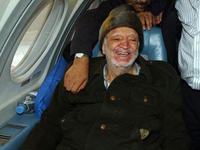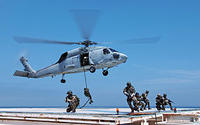-
MI6 asks for more spies in Afghanistan to fight terrorism after NATO withdrawal
MI6, the U.K. Secret Intelligence Service, is calling for reinforcements from other agencies in order to strengthen the U.K. intelligence presence in Afghanistan after NATO forces withdraw from the country in 2014. Intelligence analysts warn that Afghanistan will become an “intelligence vacuum” which will allow terrorists to pose an increased threat to Britain. Intelligence sources said that Britain’s intelligence agencies were already “very stretched” and focused on potential threats from Yemen and Somalia, a fact which might persuade al Qaeda to seek to exploit the lack of attention to Afghanistan.
-
-
Physicians feared terrorists might hack Dick Cheney’s cardiac defibrillator

In a 60 Minutes segment aired yesterday (Sunday), former vice-president Dick Cheney told the interviewer that his doctors turned off the wireless function of his implanted cardiac defibrillator (ICD) “in case a terrorist tried to send his heart a fatal shock.” Asked about the concern of Cheney’s physicians, electrophysiologists — these are the cardiologists who implant ICDs – say that as far as they know, this has never happened in the real world but that it is impossible to rule out the possibility.
-
-
Fighting al-Shabab’s recruitment efforts in U.S. Somali community

Somali community organizations in the Minneapolis-St. Paul area are taking a proactive approach to the war against terrorist recruitment in America’s Somali community. “Given our support for the African peacekeeping mission, and the fact that the U.S. remains a top al Qaeda target, we need to get ahead of al-Shabab’s efforts to radicalize vulnerable youth,” House Foreign Affairs Committee chairman Representative Ed Royce (R-California) said in his opening remarks at the hearing on the subject earlier this month.
-
-
Iraqi war- and occupation-related death toll estimated at half a million
A scientific study calculating Iraqi deaths for almost the complete period of the U.S.-led war and subsequent occupation estimates, with 95 percent of statistical certainty, that the total excess Iraqi deaths attributable to the war through mid-2011 to be about 405,000 (“excess” death means death not related to natural causes or causes other than the war and occupation). The researchers also estimated that an additional 56,000 deaths were not counted due to migration. Including this number, their final estimate is that close to half a million people died in Iraq as a result of the war and subsequent occupation from March 2003 to June 2011.
-
-
Man arrested in connection with LAX dry ice bombs
Four dry ice bombs were planted in restricted area of LAX Sunday and Monday. Two bombs exploded, causing no injury or damage, and two were found before they exploded. The LAPD announced it had arrested 28-year-old Dicarlo Bennett, an LAX employee of one of the airport’s ground crew contractors, Servisair. The LAPD chief says the police and FBI believe there was “no nexus” between the bombs and terrorism, but that the incident is related to a labor dispute.
-
-
No proof Yasser Arafat was killed by radioactive poisoning: scientists

Yasser Arafat died in November 2004 in a French hospital after rapid deterioration in his condition. He was 75 years old, but in good condition, and Palestinian and French doctors could not identify the reason for his decline. Even before he died, Palestinian leaders spread the rumor that he was poisoned on the orders of then-Prime Minister Arik Sharon of Israel. Last year, the Palestinian Authority agreed to a request by Arafat’s widow, Suha, and French judicial investigators to exhume his body for further tests. Tissues were harvested and were examined, along with some of Arafat’s personal effects, by Swiss, French, and Russian scientific teams. The Swiss team published its report this weekend in the leading medical journal The Lancet, saying that traces of the radioactive polonium-210 were found on some of Arafat’s personal effects, but not in his body tissues. The Swiss team uses suggestive language – the evidence they found “support the possibility of Arafat’s poisoning with polonium-210” and that his symptoms in the weeks before he died “might suggest radioactive poisoning” – but admit that the absence of evidence of polonium-210 in body tissues makes it impossible to say with certainty that Arafat was poisoned. The Russian scientists are more definitive. “He could not have died of polonium poisoning — the Russian experts found no traces of this substance,” Vladimir Uiba, the head of Russia’s Federal Medical-Biological Agency, said earlier today (Tuesday).
-
-
Halt of CFATS work disrupts debate over program’s merit
The budget impasse-related halting of monitoring and enforcing compliance with the 2007 Chemical Facility Anti-Terrorism Standards (CFATS) comes at a time of growing criticism of the measure by GOP – but not only GOP – lawmakers, who complain that there are too many problems with CFATS and the way it has so far been implemented.
-
-
Discovery points way to treatment of lethal toxin botulism

Botulinum neurotoxins are produced by Clostridium botulinum and cause the possibly fatal disease botulism, which impedes nerve cells’ ability to communicate with muscles and can lead to paralysis and respiratory failure. The botulinum toxin has also been identified as a potential biological weapon against a civilian population. Scientists have decoded a key molecular gateway for the toxin that causes botulism, pointing the way to treatments that can keep the food-borne poison out of the bloodstream.
-
-
More government troops than rebels killed so far in Syria
The most recent fatality report from the reliable, U.K.-based Syrian Observatory for Human Rights says that between the start of the war in March 2011 and 31 August 2013, 110,371 people had died in Syria. The breakdown of those killed: 40,146 civilians (including 4,000 women and more than 5,800 children); more than 45,000 government troops (made up of 27,654 army soldiers, 17,824 pro-regime militia, and 171 members of Hezbollah); 21,850 rebel fighters; and 2,726 unidentified people.
-
-
German neo-Nazis targeted Chancellor Gerhard Schröder for assassination

Beate Zschäpe, the last surviving members of the National Socialist Underground, a violent German neo-Nazi group, is on trial this month for taking part in the murders of eight Turkish immigrants, one Greek man, and a German policewoman, in addition to participating in fifteen bank robberies and two bomb attacks. In testimony Monday, a police investigator said that computer files found in an apartment used by NSU member indicate that in 2002, the group was working on a plot to assassinate the then-chancellor Gerhard Schröder.
-
-
Libya sliding toward anarchy: PM abducted, then released
In the most ominous sign yet that Libya is sliding toward anarchy two years after the rebellion that ended Col. Muammar al-Qaddafi’s four decades of dictatorship, members of a Libyan militia which is supportive of the government earlier today abducted the Libyan prime minister, Ali Zeidan, then released him after several hours. The anger in Libya over the U.S. Saturday operation to seize al Qaeda leader Abu Anas al-Libi, has intensified an already simmering anger toward the corrupt and ineffectual Zeidan government. On Monday, soldiers who were complaining that they had not been paid occupied Zeidan’s Tripoli office. Libyan oil production has been at a standstill since July, with striking troops in the east and tribal militias blockading ports and oilfields claiming oil revenues are being stolen by militias close to Zeidan or misspent. Libya does not have credible army, police, or security forces, and the government relies on freewheeling militias, formed during and after the anti-Qaddafi rebellion, to provide security.
-
-
Greater role for Pentagon in next phase of U.S. war on terror

The Obama administration had dramatically increased the use of drones in the war against terrorists. The number of drone strike has declined this year relative to the high levels of 2010-11. The number of drone strikes may increase again, but this past weekend’s Special Forces raids in Somalia and Libya are an indication that the next phase in the U.S. war on terrorism would see, in relative terms, less of a reliance on CIA-operated drones and a greater role for the Pentagon.
-
-
A guide to terrorist, security actors in East Africa
The continuing violence in East Africa is often attributed to Somalia’s instability, triggered by the collapse of the government more than twenty years ago, and the descent of the country into a war among war lords, tribes, and religious factions. Here is a useful guide to the main groups and organizations which operate in the region which extends from Eritrea in the north to Tanzania in the south.
-
-
Three leading African terrorist groups: similarities and differences
Three African Islamist terrorist organizations — al-shabaab, al-Qaeda in the Maghreb, and Boko Haram – have been responsible for many acts of terrorism. The three groups, or at least their leaders and most of their followers, adhere to a Wahhabi version of Islam, which is practiced in Saudi Arabia, and all oppose Western influence in the countries in which they operate. The groups also share a penchant for internal factional violence, and senior leaders of both al Shabab and Boko Haram were recently killed by rivals. There are, however, important differences among the three groups.
-
-
Libya condemns U.S. capture of al-Ruqai
The Libyan government on Sunday harshly criticized what it described as the “kidnapping” of one of its citizens after U.S. Specia Forces captured al Qaeda senior leader Nazih Abdul-Hamed al-Ruqai. The Libyan military indicated it was not privy to the U.S. operation. Libya does not have a functioning central government, except in name, and U.S. efforts to shore up the weak and demoralized Libyan security services and train them in counterterrorism have yet to bear fruit. Other problems with Libyan security services are corruption, and the fact that many in the security services are more loyal to their clan or tribe than to the government they serve. This is why even Libya’s military leaders, who have received counterterrorism training and funding from the United States, have not been informed of the operation in advance.
-
More headlines
The long view
How Male Grievance Fuels Radicalization and Extremist Violence
Social extremism is evolving in reach and form. While traditional racial supremacy ideologies remain, contemporary movements are now often fueled by something more personal and emotionally resonant: male grievance.
